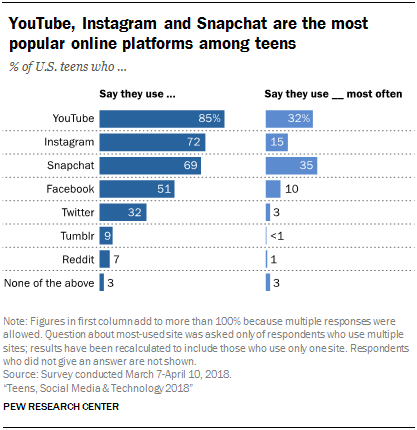h2>Dating : Digital Dating: How Your Social Media Behavior Might Be Affecting Your Relationships
Have you ever stalked your crush’s Instagram? Have you ever checked everyone who liked and commented on your girlfriend’s/boyfriend’s post? Have you ever looked at everyone that your significant other is talking to on Snapchat? Have you ever posted about your girlfriend/boyfriend or been posted about by them? If so, you might want to keep reading.
With the continuous rise of social media in our society, it now has a strong hand in the course of teenage dating. As you can see in the photo/chart below, there are several social media platforms that teenagers use frequently such as Youtube, Snapchat, Instagram, and Twitter. Additionally, in a study from Pew Research Center, they found that “45% of teens now say they are online on a near-constant basis” and another study from Pew Research Center found that “37% of teens with dating experience have taken to social media to publicly express their affection for a significant other”. With both of these numbers likely increasing, one has to question how this online presence affects romantic relationships in the lives of teenagers.
Let’s start with the good news. Many would agree that social media is, more often than not, a place for happiness. People typically post things that they enjoy and want to share with others. For example, their significant other.
Sharing a post of you and your GF/BF can be seen as a positive sign in a relationship. You’re comfortable enough and serious enough to publicize your relationship, and it can be a huge step forward in the course of a relationship. In turn, this can create a sense of joy and excitement between a couple. Not to mention it helps especially when you receive comments such as “OMG SO CUTE!” or “You two are perfect together #CoupleGoals”.
With this sort of public display of affection and positive reinforcement that many receive from their peers, social media can quite easily be seen as beneficial for a couple and can boost relationship happiness. And in one study, researchers even found that teenagers “experienced more happiness than jealousy in reaction to the partner’s activities on a social networking sites”.
Without social media, a couple might feel as if their relationship is not as serious or popular because not many people are aware of it, due to the lack of publicity. Or they might not feel as strong about their significant other and their overall relationship because they’re not receiving that same sort of positive reinforcement in the form of likes and comments.
Now comes the bad news. Social media can also prove to be harmful to teenage relationships, and this often comes in the form of jealousy. Seeing your GF/BF in someone else’s post, talking to their ex, or liking another girl’s/boy’s posts can be common behaviors online that typically elicit feelings of jealousy and frustration for couples.
This sort of information and behavior is easily and readily available for observation and new features of social media platforms only make it easier to identify. Features such as SnapMaps which allow you to see the location of your friends and the last time they were on the app. Or just posting in general which can allow you to identify where your significant other was, when they were there, and who they were with.
This sort of information is often addicting as couples want to know the whereabouts and activities of their significant other on a near constant basis, in fear of their partner cheating or jeopardizing the relationship. However, with this information being effectively permanent and so readily accessible, one can easily monitor their significant other’s behavior to a fault.
Couples might become distrusting of their partner and what they do and therefore question their commitment to the relationship. Unfortunately, this can often lead to further skepticism, distrust, and jealousy. These sorts of feelings may then lead to controlling and commanding behavior towards their significant other, that might ultimately prove fatal to the relationship as a whole.
These dueling feelings of happiness and jealousy that social media elicit, while they do vary from couple to couple, often they come down to the level of self-esteem that individuals have in their relationship.
In another study that examined the relationship between social media and romantic relationships, researchers studied the way in which self-esteem affects individuals’ feelings of jealousy and relationship happiness. They found that feelings of “jealousy [are] more pronounced for individuals with low self-esteem” and that in terms of relationship happiness, those with low self-esteem “gained more than individuals with high self-esteem”.
Therefore, the effects of both jealousy and happiness in teenage dating as a result of their partner’s social media behavior appear to be more frequent and more drastic in the case of those with low self-esteem. While those with high self-esteem still experience both in their relationships, the level of jealousy and happiness tend to be more moderate.
Ultimately, these findings led me to come up with The Social Sensitivity Theory. This theory is the idea that teenage couples are easily susceptible to the behaviors of their significant other on social media, both positive and negative, and that the feelings of relationship happiness and jealousy, and emotions similar to them, are not constant. These feelings carry a lot of influence in the overall quality of one’s relationship, and because the presence of social media both exacerbates feelings of jealousy and promotes feelings of happiness very quickly, the condition of one’s relationship can quite easily fluctuate from good to bad.
All of these ideas and examples can seem somewhat obvious and unimportant, as many may think that social media and people’s online behavior are inauthentic and attention-seeking. However, my goal is to show that the interactions that occur on social media have real world implications on the people who use them, and that specifically in dating, the importance of social media behavior can sometimes carry equal weight to the importance of in-person behavior. Whether it be good or bad, the course of a relationship can be dramatically impacted by one’s presence online, and ultimately, I believe individuals need to finally recognize the authenticity and relevance that social media holds today.




